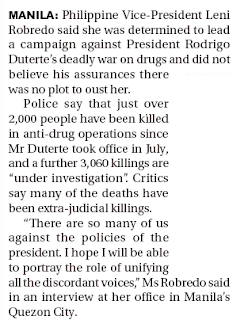Extrajudicial killings in the Philippines continue without truce. The following account painfully recounts a campaign to eliminate drugs which has lost all reason. The poor and the innocent die, the rich escape.
Gunmen
hunting drug suspect kill 7
3 teenagers, pregnant
woman among fatalities as main target escapesGunmen opened fire on two shanties in Bagong Silang, Caloocan City, on Wednesday night while hunting down a drug suspect. Their target escaped, but seven people, including three teenage boys and a pregnant woman, were killed in the shooting. The victims were neither drug users nor criminals, their mothers said. Their only fault was that they were friends of the drug suspect. Seven people, including three teenagers and a pregnant woman, were shot dead on Wednesday night by armed masked men looking for a drug suspect in Bagong Silang, Caloocan City.
“These boys are innocent. They killed our boys,” the mothers of Jonel Segovia, 15; Sonny Espinosa, 16; and Angelito Soriano, 16; told the Inquirer.
According to the police, the gunmen’s real target was Jay-R Santor, a drug suspect who earlier surrendered to authorities under the government’s “Oplan Tokhang.”
At 9 p.m. Wednesday, the masked men who were on motorcycles did not know where to find him so they fired into the two adjacent shanties in Phase 8, Barangay 176 owned by Santor’s parents.
The teenagers, along with their friends, Kenneth Lim, 20; and Edward Villanueva, 18; were in one of the shanties where a dance party was in full blast. Lim was also killed while Villanueva was wounded and taken to a hospital for treatment.
In the other shanty, three of Santor’s relatives—his mother Cristina, 45; brother Ednel, 22; and sister Analyn, 28, who was pregnant—died. Santor, meanwhile, reportedly escaped by diving into the creek behind their house.
“My son just turned 16 and they killed him like a chicken, as if he were an animal,” said Espinosa’s mother, Maria Isabelita.
When interviewed by the Inquirer, she, along with relatives of the other victims, were standing outside Crystal Funeral Parlor where they were begging authorities to release their kin’s bodies so that they could go to another establishment with cheaper rates.
According to the teenagers’ mothers, none of their children were drug users or had criminal records. Their only fault was being friends with Santor, they added, angry at claims that the boys were involved in the drug trade.
Espinosa turned 16 last month while Soriano turned 16 in September. Segovia, on the other hand, just turned 15.
Abby, Soriano’s sister, said
“But my brother does not use drugs. He does not even smoke cigarettes because one time, we caught him smoking cigarettes and we beat him up. So he stopped. Now they telling us he’s using drugs?” Abby said.
One thing the boys had in common was poverty, the reason why they were killed, according to Maria Isabelita, Espinosa’s mother.
“If the suspect is rich, they’re set free. If they’re poor, they end up sprawled on the street,” she said.
Maria Isabelita and the other relatives had another complaint as well. “Why do they want us to pay P40,000 when we can pay just P7,500 at another funeral home? We are poor, we don’t have money. Our children already died and they still want to rob us,” she said.
Hours after the massacre, she and the other kin of the victims were pleading with the police and employees of North Star Funeral Homes—the police-accredited funeral home which earlier picked up the dead—to turn over the bodies to them.
Since they were not given the right over their lives, maybe the families could have, at least, the right to handle their death?
When the funeral home refused, the families blocked the vehicles bearing their dead. “You cannot take them and make us pay a fortune. We have no money to pay you. Give us our dead,” said Segovia’s sister, Jenny.
However, the remains were taken to Crystal Funeral Homes instead. But before the bodies could be unloaded, the victims’ families arrived and blocked the process.
Another standoff started, this one lasting from midnight to 1:45 a.m. until the police and funeral home management relented, finally releasing the victims’ bodies.
Philippine Daily Enquirer, 30th December
























